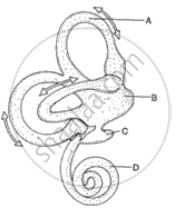Advertisements
Advertisements
Question
Draw a labeled diagram of the inner ear. Name the part of the inner ear that is responsible for static balance in human beings.
Solution

APPEARS IN
RELATED QUESTIONS
Lightning and thunder take place in the sky at the same time and at the same distance from us. Lightning is seen earlier and thunder is heard later. Can you explain?
the biological/technical terms for a thin membrane covering the entire front part of the eye.
Differentiate between Near vision and Distant vision (shape of the eye lens)
Give scientific reasons: We cannot distinguish colours in moonlight.
The three parts of human ear contributing in hearing are-
State whether the following statements are true (T) or false (F). If false, correct them by changing any one single word in each.
Semi-circular canals are concerned with static (positional) balance.
Where is the Utriculus located? Briefly mention its function.
With reference to the human ear, answer the question that follow:
Name the part of the ear associated with
(1) static balance
(2) hearing
(3) dynamic balance.
Name the part of the ear associated with hearing.
Mention the exact location of the following :
Incus
Name the tube which connects the middle ear to throat.
Why should we not put a pin or pencil in our ears ?
Give the main function of the following:
Cochlea
The diagram alongside represents the structure found in the inner ear. Study the same and then answer the questions that follow:
(i) Name the parts labelled A, B, C and D.
(ii) Name the parts of the ear responsible for transmitting impulses to the brain.
(iii) Name the part labelled above which is responsible for:
1. Static equilibrium. 2. Dynamic equilibrium. 3. Hearing
(iv) Name the audio receptor cells which pick up vibrations.
(v) Name the fluid present in the inner ear.

Given below is a diagram of a part of the human ear. Study the same and answer the question that follow:

State the functions of the parts labeled 'A' and 'B'.
Differentiate between:
Cochlea and Concha.
State the Location:
Semicircular canals
List the causes of noise pollution.
The spiral organ possessing sensory cells for hearing is ______.
Which of the following structures equalises the air pressure on either side of the tympanum?
